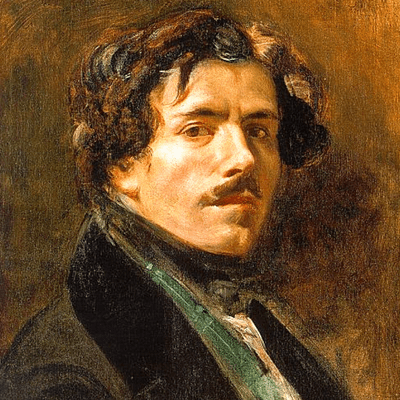
September 3, 2024
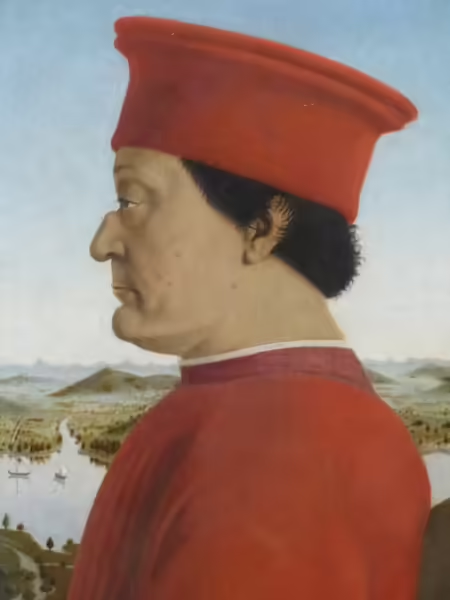
Federico da Montefeltro is the greatest man you’ve never heard of. He was born a bastard, physically scarred, and raised as a hostage away from his family — yet none of this impeded his legendary rise to power.
By (literally) fighting his way to victory, Federico became the exemplar of an enlightened despot — he was a man in total control, yet he used all of his power for the good of his people. He was faithful to his wife, transformed his hometown into the cradle of the Renaissance, and won every battle he ever fought.
Known as la luce dell’Italia (“the light of Italy”) even during his life, Federico led an entire generation of soldiers, artists, and businessmen to greatness. Nobody who met him ever walked away from their encounter uninspired — so the question is, how will his story inspire you?
What follows is the story of Federico da Montefeltro. If you want to skip to the take-aways, scroll down towards the bottom of this email.
Hope you enjoy, and welcome to INVICTUS!

Born in 1422 as the illegitimate son of a nobleman, Federico’s early life was marked by the stigma of being a bastard child. His stepmother hated him, and at the age of 11 he was the first to be shipped off to Venice when a peace treaty called for the exchange of hostages.
The young Federico also suffered from a facial skin disease that rendered him — to put it kindly — far less than attractive. With no prospects of freedom, wealth, or romance ahead of him, Federico realized the only person he could count on was himself.
With this realization, he got to work. Taking advantage of his captors’ book collection, he began reading — but he didn’t simply absorb knowledge, he applied it. He used what he learned to impress his captors and make friends in their court. Soon enough, they began to realize the scope of his potential.
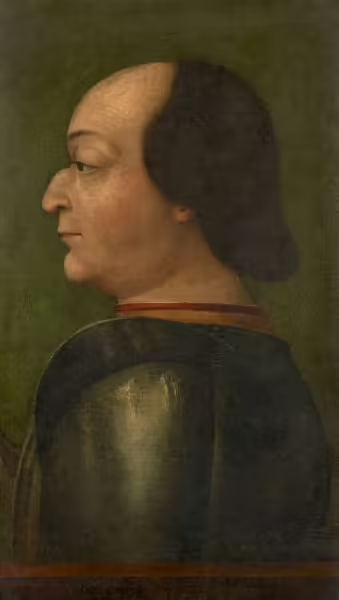
By the age of 16 Federico had secured not only a wife, but his first job as a mercenary. He found success in war by making strengths of his weakness — for example, his skin condition made him look gruff, seasoned, and relatable, and he used it to endear himself to his men.
When he was given the impossible task of taking the “unconquerable” fortress of St. Leo three years later, he defied all expectations and took it. He did so thanks in large part to the high degree of loyalty and admiration he inspired amongst his men — a feat all the more remarkable given that they were all mercenaries. He would hold the castle for the rest of his life.
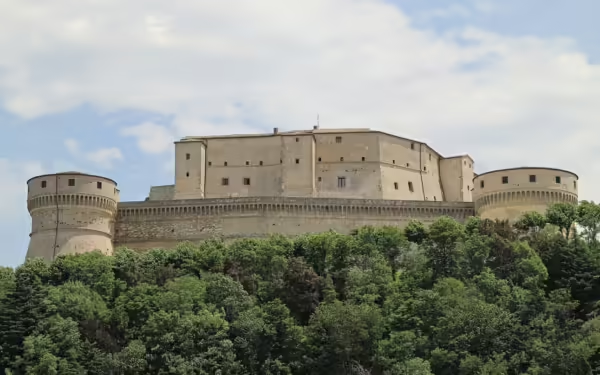
In 1444, Federico’s legitimate brother Oddantonio was killed by conspirators. Accounts vary as to the reasoning behind the murder, but most blame Oddantonio’s incessant lust, and some even suggest that he raped the daughter of one of the members of his court. With Urbino in turmoil, Federico saw his opportunity and seized it — he rallied his loyal soldiers and marched on Urbino.
Upon his arrival, restored order and was welcomed to the city as a hero. At long last, he was back in the city of his birth — the age of Federico had begun.
The Urbino that Federico inherited was far from a great city. Rather it was an unimportant backwater, located in the literal marches of eastern Italy. But instead of abandoning his people in search of wealth and glory elsewhere, Federico took it upon himself to provide for them — and provide for them he did.
Federico reinvested the money he earned as a mercenary commander into the city, building up infrastructure, constructing a university, and providing for those wounded during his campaigns. When soldiers from Urbino died under his command, he even pulled from his own funds to sustain their families.
He invested himself into every aspect of city life, walking amongst the common merchants to hear directly from them what they needed — if he passed a tax reform, for example, he would speak with vendors to understand how it impacted their bottom line.
The best testament to his popularity is seen in the fact that, despite being immensely wealthy and the sole ruler of the city, Federico walked around the streets of Urbino without an armed guard. The work he had done to improve Urbino spoke for itself, and provided him with all the protection he needed — few rulers, if any, have ever been so loved.
Federico’s power and influence increased with every passing year, and it did so by virtue of his character.
The Italian wars that Federico campaigned in were fought almost exclusively by mercenaries, and it wasn’t uncommon for a conflict to end with one city-state bribing the mercenary commander of another into switching sides. Federico knew this, and used it to his advantage — but not in the way most would expect.
Once he was on campaign for the Venetians, and Venice’s enemy offered him money to switch sides. The Venetians heard about this, and preemptively offered Federico even more money to stay with them — but Federico told them it wasn’t necessary. Specifically, he said that his honor was worth more than all their gold, and that he would never break one of his contracts.
Astonishingly, he meant it. Federico’s reputation as a man of his word quickly traveled around Italy, and it benefitted him immensely. Simultaneously fearing his ability as a commander and knowing that he would stick to his word, cities offered him extravagant amounts of money to simply never take up arms against them.
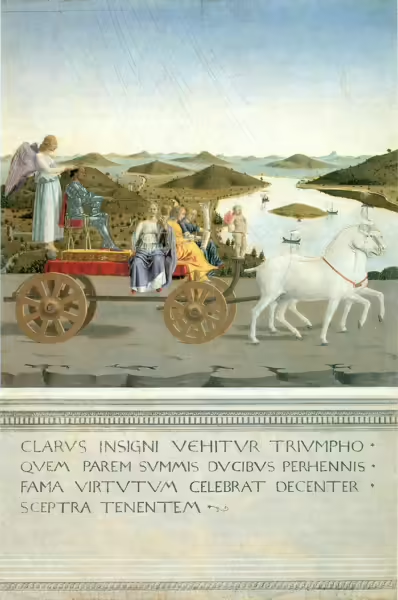
In other words, by simply being good at his job and sticking to his word, Federico’s wealth skyrocketed — he made infinitely more money than ever before, while simultaneously working less. He was being paid not to fight!
All of this profit, of course, got reinvested into Federico’s beloved Urbino. Shaped by his lonely upbringing in the libraries of his captors, he understood the degree to which reading — and specifically, the study of history and philosophy — could change the course of one’s life.
As such, he commissioned a great library to be built, and great it was. Second only to the Pope’s library, Federico’s biblioteca was sought out and visited by scholars, artists, and rulers from all over the world. Urbino was now one of the premier cities in Europe — all thanks to the work and dedication of its Renaissance leader.
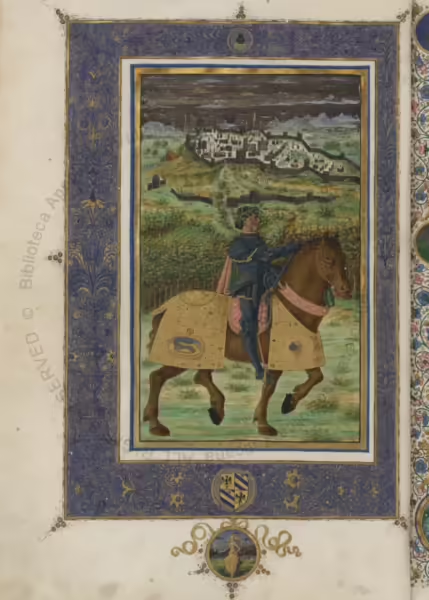
Federico da Montefeltro’s legacy has likely impacted you more than you realize. Raphael, who is most famous for painting The School of Athens, hailed from Federico’s Urbino. Michelangelo’s artistic vision of theology, which was inevitably expressed in his work, was indebted to his favorite copy of Dante’s Divine Comedy — a copy annotated by Cristoforo da Landino, a writer under Federico’s patronage.
Most impressive, however, is the fact that Federico, in the midst of all his other accomplishments, was also a great father. He raised a son who followed in his footsteps both militarily and politically, continuing the Renaissance work his father had started.
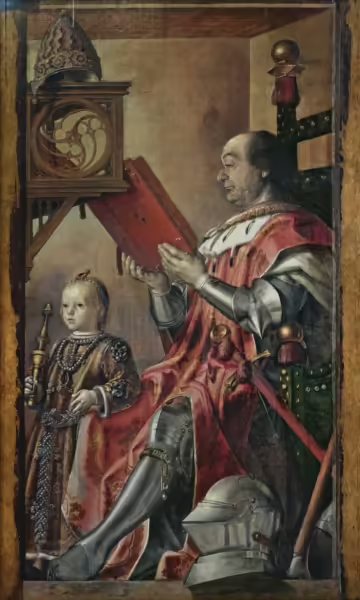
Federico’s son Guidobaldo was by all accounts a great man — Baldassare Castiglione’s The Book of the Courtier describes life in his court, which was one of the most refined and elegant in all of Europe. Guidobaldo’s legacy was cut short only by illness, as the young man died from gout when he was just 36 years old.
Hopefully by now you understand why Federico da Montefeltro is one of history’s greatest men — outstanding at his job, a man of his word, benevolent, faithful to his people, and a good father. Let’s now look at three of the main takeaways to be learned from his life.
When Federico lived as a hostage, he made the most of his time by exploring his captors’ libraries. When he suffered from his skin condition, he used it to endear himself to soldiers under his command. His success, both intellectually and militarily, is directly due to him transforming his weaknesses into his strengths.
As a bastard, Federico had no reputation to lean on — so he had to create one for himself. He did so by engaging with his captors, excelling at his job on the battlefield, and being a man of his word. In his case, the combination of competency and honor resulted in cities paying him immense amounts of money to never lead an army against them — they both feared his competency, and trusted his word. Federico’s reputation carried him to more success than his military victories ever did.
As a hostage, Federico was particularly shaped by his study of both history and philosophy. By investing time in these fields, he grew as both an individual and a ruler. But more importantly, Federico then paid it forward and invested in his people. By taking care of those around him, he took care of himself — he inspired his troops’ loyalty in an age of mercenaries, and was able to walk freely in his own city unguarded. By investing in others, he transformed Urbino into one of the main cradles of the Renaissance — and his own legacy grew with it.

I hope you’ve enjoyed this first edition of INVICTUS. Feel free to reply with your thoughts on how I can improve things for future emails!
If you feel particularly inspired by this email and want to show your support, the best way to do so is by purchasing a fresh bag of Imperium Coffee — all the proceeds go towards making more content like this and helping others learn from the example of great men.
Thanks for making it this far, and have a great rest of your week!
Ad finem fidelis,
Evan
PS — If you want to learn more about the life of Federico da Montefeltro, I have two suggestions:
The first is to read the book The Light of Italy: The Life and Times of Federico da Montefeltro. It is the only English language biography on Federico I’m aware of.
The second is check out the Space I hosted on X about Federico’s life. My friend James joined me for it and contributed wonderfully — he likes Federico so much, he named one of his sons after him!